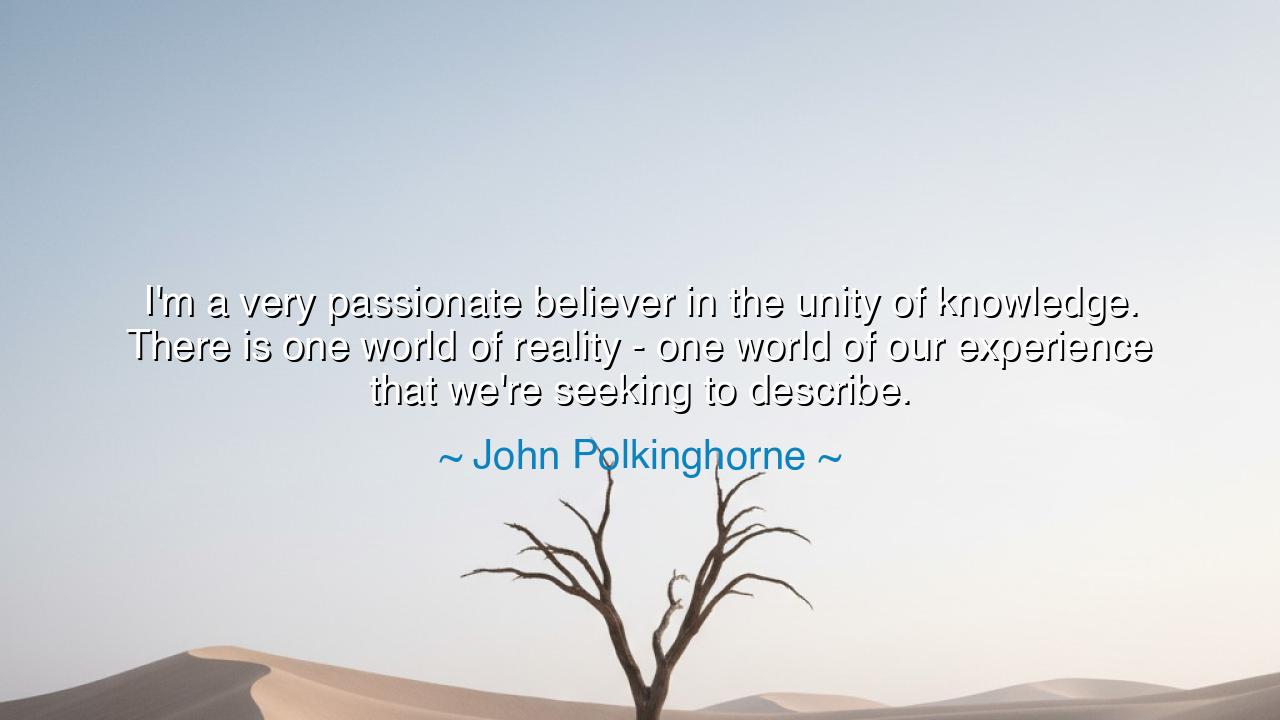
I'm a very passionate believer in the unity of knowledge. There
I'm a very passionate believer in the unity of knowledge. There is one world of reality - one world of our experience that we're seeking to describe.






“I’m a very passionate believer in the unity of knowledge. There is one world of reality—one world of our experience that we’re seeking to describe.” Thus spoke John Polkinghorne, the physicist-priest who walked the delicate bridge between science and faith, between the seen and the unseen. His words shimmer with a timeless truth — that reality is one, though we approach it through many doors; that all our seeking, whether through the microscope or through prayer, leads us toward the same eternal light. In an age that loves to divide — to separate matter from spirit, science from philosophy, heart from mind — Polkinghorne’s voice calls us back to wholeness, to the sacred unity of all knowing.
The meaning of his words lies in their harmony. Polkinghorne, once a physicist at the cutting edge of quantum theory, later became a theologian, seeing no contradiction between his two callings. For him, knowledge was not a battlefield but a conversation — a tapestry woven from the threads of different disciplines, each revealing another face of the same mystery. When he speaks of the unity of knowledge, he proclaims that truth cannot be divided into compartments. Whether it is the law of gravity or the law of love, the motion of galaxies or the stirrings of conscience, all belong to the one world of reality that humanity is striving to understand.
The ancients, too, knew this unity. In Plato’s Academy, philosophy was not a narrow study but the pursuit of wisdom that bound mathematics, ethics, and metaphysics together. In the House of Wisdom of ancient Baghdad, scholars of faith and science worked side by side, translating, studying, and expanding the horizons of both worlds. The great Leonardo da Vinci, painter and engineer, scientist and poet, embodied this same ideal — that the human mind is not divided, but one. To see the unity of knowledge, Polkinghorne reminds us, is to remember that truth is not the possession of one domain but the inheritance of all humanity.
And yet, in the modern world, the unity he defends has been forgotten. The disciplines that once worked in harmony have become estranged. Science, proud of its precision, sometimes forgets wonder; religion, in its zeal for the sacred, sometimes forgets inquiry. But Polkinghorne saw both as lenses through which we view the same vast mystery. He knew that to understand the world, one must look both outward and inward — to measure the stars and to listen to the silence of the soul. For reality, he said, is not split between material and spiritual; it is one great truth, radiant and indivisible.
To illustrate this, consider the life of Isaac Newton, who uncovered the laws of motion yet spent his evenings studying Scripture and alchemy. To him, the universe was not a cold machine, but a divine order, a revelation of the Creator’s mind written in the language of mathematics. Or think of Albert Einstein, who once said, “Science without religion is lame; religion without science is blind.” Both men, like Polkinghorne, understood that knowledge is not war but worship — an act of reverence before the unity of all things.
The one world of experience that Polkinghorne describes is the sacred stage upon which all human discovery unfolds. Whether we gaze at the atom or the galaxy, whether we study morality or mathematics, we are explorers of the same creation. Each insight, however small, illuminates a corner of the same infinite mystery. To deny this unity is to blind ourselves, to see only fragments where there is wholeness. The wise, therefore, do not separate but integrate — they see that the hand that writes equations and the heart that prays both reach toward the same horizon of understanding.
So let this teaching take root in your soul: seek unity in knowledge. Do not despise any path to truth, whether it comes from experiment or meditation, from art or reason. Cultivate curiosity in all things and reverence for the mystery that binds them. Learn to see the divine symmetry between the laws of physics and the laws of compassion, between the order of the cosmos and the order of the conscience. For in the end, there are not many realities, but one — and our duty as seekers is to see that unity clearly, to live it fully, and to honor it in thought and deed.
Thus, as John Polkinghorne reminds us, the world is not divided between sacred and secular, between the material and the divine. It is one vast harmony — a single song with many voices. To know this is to walk in wisdom; to live it is to find peace. For the unity of knowledge is not merely an idea — it is the truth of existence itself: that all we learn, all we love, and all we are, flow from the same eternal source.






AAdministratorAdministrator
Welcome, honored guests. Please leave a comment, we will respond soon